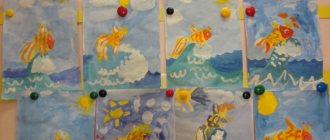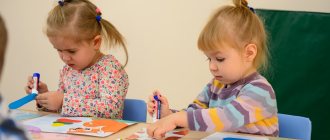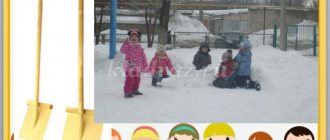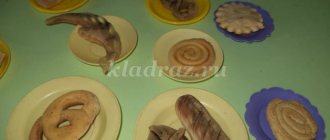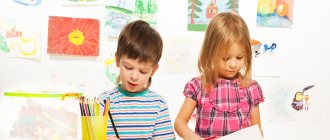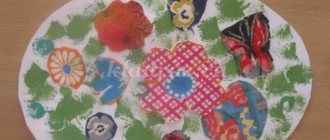Welcome!
Let's decide together
Can't enroll your child in kindergarten? Would you like to tell us about the teachers? Do you know how to improve your diet and exercise?
Questionnaire for surveying service recipients about the quality of conditions for the provision of services in an educational organization
Dear parents (legal representatives)!
In accordance with the requirements of the administration of the Krasnodar Territory (letter from the Deputy Head of Administration (Governor) of the Krasnodar Territory V.A. Shvets dated May 27, 2022 No. 10-05-345/20 “On rescheduling”) the deadline for accepting applications for staffing kindergartens in 2020-2021 academic year is postponed from June 1, 2022 to June 15, 2022.
On the postponement of recruitment deadlines for preschool educational institutions
Decree of the President of the Russian Federation dated March 25, 2020 N 206 “On declaring non-working days in the Russian Federation”
Decree of the President of the Russian Federation dated 04/02/2020 No. 239 “On measures to ensure the sanitary and epidemiological well-being of the population on the territory of the Russian Federation in connection with the spread of the new coronavirus infection (COVID-19)”
Resolution of the head of administration (governor) of the Krasnodar Territory dated March 13, 2020 No. 129 “On the introduction of a high alert regime in the Krasnodar Territory and measures to prevent the spread of the new coronavirus infection (COVID-2019)”
Resolution of the head of administration (governor) of the Krasnodar Territory dated March 31, 2020 No. 185 “On the introduction of restrictive measures (quarantine) on the territory of the Krasnodar Territory”
Hotline
8 (86130) 39-1-08
8
8 (86130) 4-01-10
Dear friends!
Naumova Tatyana Valentinovna - head
We are glad to welcome you to the website of our kindergarten! Kindergarten is a special world, where children fully feel like children. Our teachers and educators try to make the lives of their students interesting and eventful. The focus of our friendly team is the child with his unique personality. To reveal all his capabilities, talents, to create conditions for strengthening his health, for independent knowledge of the world around him, for introducing him to the world of beauty, for happy moments of play - these are the tasks that are the most important for the staff of our preschool institution.
We try to create conditions for organizing an effective educational process - cozy rooms with a variety of games and educational materials, a music and sports hall, a speech correction room - everything is created for a pleasant stay for children in our institution. Our kindergarten employs experienced teachers who use modern pedagogical technologies in their activities. Over the many years of operation of the garden, a friendly team has formed. Our institution has a warm, friendly atmosphere, which is why cheerful children's laughter can be heard from the windows. What could be better than a healthy and happy child? Let's answer - only a lot of happy girls and boys. Our site is, first of all, addressed to those who are interested in the harmonious and comprehensive development of their child, who are ready to share their experience and talk about the difficulties of raising and educating a preschooler, and who want to cooperate with qualified specialists.
Dear visitors!
Our kindergarten
- these are sweet, kind, smart, cheerful, noisy, wonderful children. Everything we do in our kindergarten is for their sake, so that they grow and develop.
Our kindergarten
- these are employees. The most hardworking, creative, able to do everything, rooting for everything with their souls, loving children.
Our kindergarten
- this is family. And like any friendly family, we have our own traditions.
On our website you can • find out:
- latest kindergarten news;
- about the life of children in the group; • find:
- information about the kindergarten and the programs for the education and training of preschool children implemented by the teaching staff;
— advice from kindergarten specialists; • visit the photo gallery; • ask questions you are interested
in regarding the upbringing and education of children.
We hope that the site will be of great use to both the parents of our kindergarten students and everyone else!
Opening hours: from 7:00 to 17:30
Drawing on the theme “Beautiful Bird” in the middle group of kindergarten
Birds are representatives of wildlife that are familiar to children from an early age through fairy tales and personal observations. These animals differ in plumage, size, and habits, so every boy or girl will be able to find their favorite breed among them, which they want to portray.
One of the simplest and most interesting drawings"
The purpose of drawing on the theme “Beautiful Bird” in a preschool educational institution
The main goal of this event is to develop children's creative abilities and gain skills in individual and group work.
Example of lesson notes
- Introducing children to the topic of the lesson;
- Distribution of additional materials;
- Reviewing with students diagrams, templates, illustrations of what they need to draw;
- Step by step drawing;
- Discussion of the work done and summing up the results.
Next riddle
Strengthen children's ability to correlate flat geometric shapes with the shape of parts of objects, create an image from ready-made parts, and independently cut out small parts.
| The attachment | Size |
| konspekt_zanyatiya_po_applikatsii_v_sredney_gruppe.doc | 31.5 KB |
On the topic: methodological developments, presentations and notes
Summary of a speech therapy lesson for a teacher - speech therapist S. V. Turovskaya. Summary of the lesson "Sound "U""
Topic. Sound U. Purpose. Strengthen the skills of clear pronunciation of sound. Educational objectives: 1. Introduce children to sound.
Lesson notes in mathematics Lesson notes in mathematics in the middle group Topic: Plan (travel map) Program tasks: Develop the ability to navigate according to an elementary plan, correctly determine the relative position of objects in the
Lesson notes in mathematicsLesson notes in mathematics in the middle group Topic: Plan (travel map) Program objectives: Develop the ability to navigate according to an elementary plan, correctly.
Lesson notes Lessons on speech development Notes of the final lesson on speech development “Visiting grandma”
Lesson notesClasses on speech developmentLessons of the final lesson on speech development “Visiting grandma.”
Summary of an open lesson in a preparatory group for school Summary of an open lesson in a preparatory group for school Summary of a lesson in a preparatory group of a teacher-psychologist with hearing-impaired children
Date: February 21, 2012 Participants: children of the preparatory group Conducted by: educational psychologist Panova M.M. Purpose: to promote formation.
Notes for a comprehensive lesson in mathematics and design in the second junior group Notes for a comprehensive lesson in mathematics and design in the second junior group Notes for classes
Introduce children to number and figure 6. Improve counting skills and comparison of subject aggregates. Form children’s ability to distinguish between the concepts of yesterday, today, tomorrow. Consolidate knowledge about geome.
Lesson summary “Travel to Africa. How to help a boa constrictor? outline of a lesson in mathematics (preparatory group) on the topic outline of a lesson on the world around us (preparatory group)
Lesson summary “Travel to Africa. How to help a boa constrictor?” Program content: 1. Educational: learn to use a conventional measure when determining the size of objects.
1. Lesson notes on the surrounding world (01/11/2021) 2. Math lesson notes (01/13/2021) 3. Speech development notes (01/15/2021) 4. Drawing notes (01/19/2021)
1. The surrounding world Topic: Winter sports. 2. mathematics Schitariki-Smeshariki. topic: counting from 1 to 53. speech development, conversation with a puppet theater based on the fairy tale Rukavichka.4. drawing theme: Winter.
Questions for children based on their drawings
You should not finish the lesson immediately after drawing. Children should be encouraged to talk about what and why they drew. You can give the guys a little time to create a full-fledged history of their bird, give it a name, come up with a breed if one does not exist.
You can also ask the children whose bird is the most beautiful and why. But with this task you need to be very careful, because you cannot single out anyone, and you should not deprive them of attention. Some can be praised for their drawing technique and accuracy, some for their unusual story, and some for their successful combination of colors and realism.
This lesson will introduce children not only to a whole section of wildlife, but will also help develop their creative and social skills. For these reasons, art lessons should be taught as early as possible so that children from an early age are introduced to the broad concept of “beauty” and learn to work in a team.
Summary of the drawing lesson “Decorate your toys (decorative drawing)”
Lesson notes
“ Decorate your toys
(decorative drawing)”
for children of the general development group, aged 4 to 5 years
Date of:
Educational area:
Artistic and aesthetic development
Class:
Drawing
Priority:
Artistic and aesthetic development is integrated with physical development, social and communicative development, speech development, cognitive development.
Target:
introduce children to the features of Dymkovo painting.
Tasks:
Educational:
— Continue to introduce children to Dymkovo toys, teach them to note their characteristic features, and highlight the elements of the pattern: circles, rings, dots, stripes.
— To strengthen children’s understanding of the bright, elegant, festive colors of toys.
— Reinforce brush painting techniques.
Educational:
— Develop aesthetic perception.
Educational:
— Cultivate accuracy in working with gouache.
Preliminary work:
Acquaintance with Dymkovo products and their painting. Modeling toys.
Forms of work
: Individual, joint activities of the teacher with children, independent activities of children.
Methods:
Verbal:
questions for children, conversation about toys.
Visual
: Dymkovo young ladies, duck, horses, pictures of Dymkovo toys, a sample of a decorated toy
.
Practical:
productive activity.
Types of children's activities
: gaming, communicative, motor, productive.
Individual work
: One toy is drawn on the sheet, draw and paint the second one by analogy.
Materials and equipment:
Demo material
: Dymkovo young ladies, duck, horses, pictures of Dymkovo toys, a sample of a decorated toy
.
Handout:
Landscape sheets, gouache paints, brushes, a jar of water, a napkin (for each child).
Motivation:
invitation to the Dymkovo Toy Museum.
Progress of the lesson:
I. _ Introductory part
Motivational moment:
Educator:
Guys, today I have prepared a surprise for you.
Have you ever been to a museum? ( children's answers
) I invite you to the museum.
Would you like to visit the museum with me? ( children's answers
) Close your eyes (
music sounds
).
Open your eyes. Here we are in the museum ( they go to the table with toys
)
II.
Main part Educator:
Today there is a toy exhibition at the museum.
Look at them, how bright and elegant they are. Can someone tell me what these toys are called? ( children's answers - Dymkovo
) That's right, this is a Dymkovo toy!
Let's, guys, remember the history of this toy. Why were they called that? ( children's answers - because they were made in the village of Dymkovo
) Educator: Why was this village called Dymkovo?
( children's answers
) That's right, because in winter, when the stoves are heated, and in summer, when there is fog, the village seems to be in a haze (
looking at pictures of a village in winter)
Educator:
There is a column of smoke from the chimneys, as if everything is in a haze.
They gave a blue light, and the large village was named “Dymkovo”. People loved songs and dances there, and wonderful fairy tales were born in the village. All toys are not simple, but magically painted. They themselves are snow-white, like birch trees, and they have bright circles, squares, and stripes on them. Educator: Yes, in the old days, in the village of Dymkovo, the Dymkovo toy was born.
What did the craftsmen make it from? ( children's answers - We made this toy from clay)
.
But clay toys don’t look very elegant, so how did Dymkovo ones turn out so cheerful and elegant? ( children's answers - because the Dymkovo masters painted them with bright patterns
) Educator: What elements of painting did the masters use? (children's answers - circles, stripes, dots, grid, ring) Educator: Well done, right. Do you know that there is a secret in these elements: the circle means the sun, the wavy lines mean water, and the intersection of straight lines means the earth. Educator: What colors did the masters use to paint the toy?
(red, yellow, green, blue, orange) Educator: Look, guys, there’s a little duck swimming in the lake. And here are her ducklings. What happened to them, why are they all white and not as bright and beautiful as their mother? What are we going to do? ( children's answers)
I invite you to be a little master of the Dymkovo toy.
Educator: Let's go to our workshop.
Physical education minute . The ducks came out into the meadow, quack-quack-quack! (We walk.) A cheerful beetle flew by, J-z-z! (We wave our arms like wings.) The geese arch their necks, Ha-ha-ha! (Circular rotation of the neck.) The feathers are straightened with the beak. (Turns the body left and right.) The reeds whispered in the water, Shhhh! (They raised their hands up and stretched.) And again there was silence, Sh-sh-sh.
Educator: Look, guys, in our workshop we have everything to turn an ordinary figurine into a real painted Dymkovo toy.
You and I will paint our ducks with Dymkovo patterns. Let's look at the patterns on our duck ( look at the patterns on the duck)
Educator: A duck is a favorite image in folk art associated with the sun and abundance.
The chest and wings of the bird are decorated with patterns reminiscent of a large and small sun. Duck-Marfutka is walking along the shore, Duck-Marfutka is leading him to swim. Educator. Look how I decorated my duck. Guys, remember how to work when painting. Before picking up another paint, you need to rinse the brush, and only then take another paint. Now we draw dots with the tip of the brush. We draw the stripes by placing the brush on the paper and moving it from left to right. And now I propose to take your jobs. See what's ready for work. We remember how we use a napkin, how we remove excess paint, and rinse the brush. ( Work done by children
) Educator: Guys, you are real folk craftsmen, you did a good job.
Children look at the painted ducklings and express their opinions.
Children close their eyes, music sounds.
III. Final part
Educator:
Here we are again in kindergarten.
- Guys, where have we been?
– Whom did we describe?
— Did everything work out for you or did you have difficulties?
Preliminary work with children, discussion of the topic
Before moving on to the main part of the task, you should make sure that the children have a complete understanding of birds. To do this, you need to show them these animals live. If it is spring or summer at the time of the lesson, then you can go outside, because birds are especially active during this period. If it’s winter, when many birds go south, you have to be content with pictures or stuffed animals. You should also tell children about different types of birds, among which are:
- Migratory;
- wintering;
- domestic.
It is also necessary to talk about the diet of birds: mosquitoes and other insects, seeds and fruits. To captivate children even more, you can tell children fairy tales about these animals, ask them to guess riddles about birds, and also talk about interesting expressions like “small bird.”
Physical education minute
To prevent children from getting bored, physical education sessions must be held once an hour. If the room is large and spacious enough, then you can perform several dance moves to funny short songs.
Note! You can find songs about birds and invite children to perform flapping movements to the music, similar to flapping their wings. If the class is not very large, then you can do eye exercises.
Physical education for birds"
